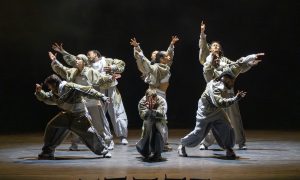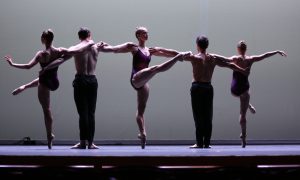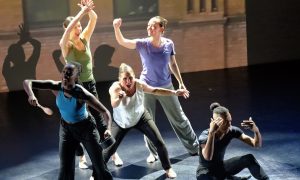For those in the street dance community, hearing the name Juste Debout sparks not just a twinkle of recognition but an added dose of both awe and respect. No surprise there: it is often considered to be the ultimate and most prestigious in freestyle street dance battle events (certainly the largest) in the world. Its notoriety built over its 18-year history is as unquestionable as the talent of the dancers skilled and determined enough to compete at its Paris Finals, held each year at the AccorHotels Arena (formerly called the Palais Omnisports de Paris-Bercy), and host to over 16,000 paying spectators.
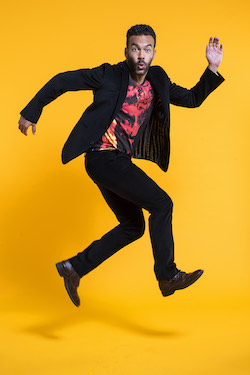
As is the case with a great many successes, especially in dance, the now mega-event came from humble beginnings. Born out of a desire to create a badly needed platform for street dancers to be able to perform and connect, its founder, Bruce Ykanji, started the first edition in a gymnasium in Champs-sur-Marne, a Parisian suburb about 18 kilometers from the center of town. Dance Informa had the good fortune to be able to sit down and video chat with Ykanji himself, and hear him tell the story of how it all began.
“At the time, there were a lot of breakdance (b-boying) events, in which there was a lot of breakdancing but very little time reserved for us, the street dancers,” Ykanji shares. “All the poppers, lockers, hip hop dancers, house dancers — there was no platform for us; we had nothing. In the ’90s and the beginning of 2000s, there were one or two events, but they were still split between the breakers and ourselves. The breakers took up a lot of the time. Since we were the minority, we had no leverage to say anything, to ask for more time.”
He continues, “So, in 2001, I took five of my most motivated students — not the best but the most motivated — to New York, and we took classes with teachers like Brian Green. The following year, we went back, and afterward we told ourselves, now we absolutely need to take what we’ve experienced in New York and bring it to France and make an event out of it. That’s when Juste Debout was born.”
Ykanji himself is a dancer with an interesting story. Born in Paris to a French mother and a Franco-Cameroonian father, his family emigrated to Cameroon when he was five. It was during his time in Cameroon that Ykanji was first touched by dance. When he was eight years old, his father, a traveling businessman, brought back a videocassette that had an ad in it for the 1984 hit movie, Breakin’. Young Ykanji was taken by the images of dancers gliding and waving on the screen, elements that would later greatly influence his own style of street dancing, a style called “Smurfing”.
“Smurfing is a style that exists in France but doesn’t really exist in the USA,” Ykanji says. It is a style characterized by a lot of gliding — one of the strongest inspirations coming from the very first images of dance that he had seen on that memorable videocassette. “It made an impression on me, and it has since remained in my dance DNA.”

Photo by Little Shao.
Five years after having emigrated to Cameroon, his father passed away, and the family moved back to France.
As Ykanji tells it, the move back to France was when “real life” began: a mother with three children, now living in the suburbs of Paris, meant that their lifestyle was suddenly not at all the same as it was when his father was alive. This is when dance became a powerful force in Ykanji’s life, a difficult time that he says dance helped him through. “When you lose your dad at 10 years old, and you change countries, everything is different.”
Listening to his story, I both feel for him and understand. It is not surprising then, that he describes a rebellious nature after the move back to France and the loss of his father.
“I was bad at school, so I studied cooking,” Ykanji reveals. “I became a cook. I used to dance in the kitchen, and the cooks would all be screaming at me to stop.” His mother did not want him to dance, because at the time, the prospect of becoming a professional hip hop dancer was not really a career path that existed. In the ’90s, there weren’t many real opportunities for a street dancer to make a living off of his craft. He studied cooking mainly for her, but what he really wanted to do was dance.
“When your mother is taking care of you and two other children and has struggled all her life for you, you don’t really want to disappoint her,” he says. So he waited until he was 21, got his own apartment and decided to take a sabbatical year off of cooking to begin dancing more seriously.
It was a wager on himself that proved to be a winning bet. “Within three months of the start of my sabbatical,” he says, “either through luck, talent or both, I managed to get a tour with the French rapper MC Solaar, who sold the most albums in France (1997).” Ykanji’s career went up from there, as by that time hip hop culture was starting to become mainstream.
But it was in 2002, with the birth of the first edition of Juste Debout, that the legend begins.
“At the first event in 2002, we had 400 people attend,” Ykanji explains. “So for the second event in 2003, we were expecting about 800 people.”
As it turns out, 1,200 people showed up to that second event. From there, attendance nearly doubled in each consecutive year: 2,500 people in 2004, 5,000 in 2005, 7,000 people in 2006. By 2008, they had no choice but to move to Bercy Stadium because there were just too many people.
“It totally overwhelmed me,” Ykanji says. “It exceeded my expectations; it became an incredible success. It was a time when the Internet was gaining speed; we were evolving with that. But in the beginning, it was all by word of mouth.”
But although Juste Debout is structured like a dance battle, feels like a dance battle and is seen by its international audience as a dance battle, to Ykanji, it is all about something totally different.
“It’s a jam,” he says. “In fact, I’ve never called it a battle. If you look on the flyers, it says ‘Rencontre internationale de danse Hip Hop’ (International Hip Hop Dance Get Together, or Encounter). To me, it’s not a battle, it’s a get together. The battle is just a pretext to meet one another. For me, what’s interesting is when I meet with you, I meet with others, when the Americans come, the Japanese come; that’s what excites me. When we all go out, when we take dance classes, people exchange numbers, hang out together. The essence of Juste Debout is not Juste Debout, actually. The essence of Juste Debout is everything that happens around it.”
A focus that is less about the event itself than it is about people and the dance through which they express their individuality. Even the name of the event, Juste Debout, is a direct reflection of this central focus.
“I’ve always liked precision (‘justesse’ in French) — justice, being proud, being upright, standing tall, having pride in oneself, knowing where you’re going, knowing where you want to go,” Ykanji shares. “Especially the precision in movement. That’s what Juste Debout represents; it’s not just ‘Juste Debout’, just upright, just stand up (as opposed to breakdancing, which happens mainly on the ground). It means that, too, but it also means being just, loyal and especially trying to excel, basically. To excel at what you do. That’s why it’s called Juste Debout.”
But economics is also a reality, and the success of the event can also be attributed to a business acumen in Ykanji that may well be an influence coming from his father.
“At the core, I’m an artist, a dancer,” he says. “But I have to charge admission, I sell the DVDs, so there is a part of what I do that is business. I am really a business-type person, because for me, art and culture needs business in order to live. I have understood that for a long time.”
His philosophy of dance and art aligns with his business philosophy: to continually innovate, to stay ahead of the game. To remain new and original. Even to perhaps stimulate a certain amount of controversy.
“Something that does not interest me at all is copying,” he says. “To dance just like everyone else. But it would be pretentious of me to say that I wasn’t inspired by others. I’ve been inspired by tons of things — in dance, by people, by life. But I don’t like people who don’t have a personality. I like big mouths, people who stand up to me, people I quarrel with sometimes and afterward we reconcile. That is life. Take a painter, for example. You can be a good painter or a bad painter, but the essential thing is that people stop in front of your canvas. If people don’t stop, then you’re just some guy who made a painting. People have to stop and discuss your painting, whether they like it, or don’t like it. That’s what I like. That’s who I am. I love the debate. I’m not against conflict; sometimes it’s important in order to solve certain things. Everyone has to be able to express themselves — real freedom of expression.”

Photo by Little Shao.
This combination of emphasis on individuals, the focus on excellence, and the understanding of the necessary link between business, originality and art without necessarily avoiding conflict is probably what lies at the core of his success — the passionate dynamism of life, reflected in the passionate dynamism of dance, and vice versa. Defining success, however, is subjective and individual.
“When I look at my project in 2001, almost 20 years ago, my first goal was to get dance to evolve in the suburbs, then if I could, in Paris, and hopefully throughout France,” Ykanji reflects. “Then my crazy dream was that it would spread throughout Europe, and then the really extreme was that it would spread throughout the entire world. When I look at that, I think, no, I still have the same goal: to get dance to evolve, to get the dancer to evolve, to get the dancer’s situation to evolve, to get things to evolve, to really push. You ask me about my definition of success today with respect to yesterday’s, and it’s the same, and you can’t quantify this definition.”
He continues, “That is to say, of course, I’d love to make millions from Juste Debout, but the success of Juste Debout has already happened. In people’s minds, it is an event that has already made its mark on their lives. It has gotten people to evolve, gotten people seen, stimulated crossovers between people from different countries. For me, that’s success — when the event overwhelms you, and people keep asking for it. For me, it’s never enough. Have I pushed it as far as it can go? I’d say, no, I haven’t.”
The year of the virus
Enter the year 2020, the year that a global pandemic hits us all from behind and brings an entire performing arts industry to a screeching halt. Industry giants have been brought to their knees, with dance performances, events and competitions cancelled all over the world. Juste Debout is no exception. Not only did the 2020 edition of the Juste Debout event have to be cancelled due to COVID-19, but the Juste Debout School (a hip hop school that Ykanji established in 2009) had to be closed for four months because of it as well.
And how does he feel about all of this?
“I feel resigned,” he admits. “Because after all that, what will happen will happen, and what won’t happen won’t happen. It is what it is. So now, how are you going to come back from it? How are you going to bounce back? Because it’s great to be at the top for a year, two years, three years. But how are you going to stay there? One has to perpetually re-question oneself. And one has to have the leadership to be able to bounce back.”
Ykanji adds, “I think that for the next few years, dancers and organizers are going to really suffer. Because when something like this happens, culture is really that last wheel on the coach. It’s normal; we have to eat, we have to live, the economy has to work. For people in the government, it’s the last wheel on the coach. Even if they say, ‘People have to go out, they have to do sports, they have to dance,’ we know very well that they’re not going to put millions into it. In France, anyway. So it’s going to be hard. I think that the dance world has not measured this yet. I think that dancers are still a bit on their cloud and think that things are going to go back to the way they were before. But unfortunately, that won’t be the case. Why? With respect to business, when you look at companies on the largest scale — even just the airline companies, there are a lot that have gone under.”
He goes on, “People are still scared. We’ve succeeded in instilling fear. Fear is very easy to instil but very difficult to remove from people’s minds. So before people will go back to going to performance venues, before they start coming back to classrooms, it’s going to take time. I’d like to be positive. But I think we’ll have to postpone our passion and not be afraid to diversify what we do. It’s going to be very hard for us. But I continue to believe in it, because I also think that people are going to dance their entire life. In wartime, people dance; in mourning, people dance; during the rainy season, there’s a rain dance; during the harvest, there’s a harvest dance. Dance is vital. So people will dance. But professionally…”
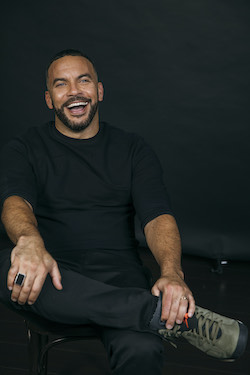
He says this last bit with a laugh that I’m not sure comes from nervousness or a sudden ironic realization of the gravity of what he’s saying.
“…professionally, I don’t know.”
So his advice to dancers is very clear. “If we get back to living again normally, put money aside. What I’m saying is very materialistic, but it’s vital, too. There are a lot of dancers who live day to day; there are a lot of dancers who, unfortunately, think that we dancers are indispensable. In this respect, I think COVID is a good thing. Because we’ve all re-questioned ourselves, thinking, ‘Well I can no longer get a ticket to go there…this event doesn’t exist anymore.’ So now, everyone is going live online to perform. Live, live, live, every day there’s a live online performance. In order to continue to exist. The ego that still needs to be fed. See, it’s very positive to fall down sometimes. On the other hand, I don’t know if this is going to last and if humility is going to take more ground. But in any case, my advice to dancers is to continue to dance, and to continue to create and to find solutions.”
He adds, “You’re the one who has to attack. Otherwise, life slaps you in the face.”
But Ykanji makes it all the more poignant by quoting the French rap artist Kery James. “There’s something that the rapper Kery James says: ‘What have we done for ourselves?’ I find this is a very true phrase. You can complain, but what have you done for yourself?”
Uttered clearly and simply, as if from the mouth of a child. And if the old saying that truth comes from children’s mouths is true, then there is no more to add to this, and nothing else to say but to repeat.
What have we done for ourselves?
For more information on Juste Debout, head to juste-debout.com. You can also follow the event on Instagram: @justedebout_officiel.
By Rick Tjia of Dance Informa.






